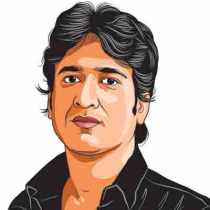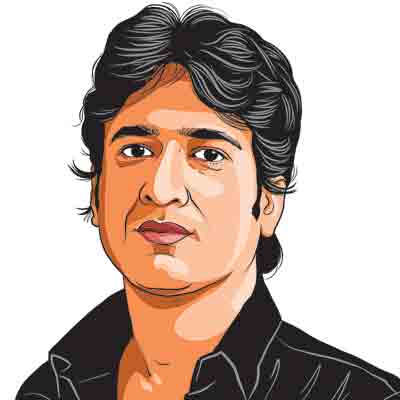Scheherazades Of Bastar
Local journalists in this conflict zone rarely receive the credit they deserve

Reporting from a conflict zone is perhaps the final frontier for many such story-tellers.
Story-telling is a way to overcome the fear of death. Whether a novelist or a journalist, the underlying yearning remains constant. With the end coming closer every moment, some find solace in the hypnotic belief that the word will survive its writer.
Reporting from a conflict zone is perhaps the final frontier for many such story-tellers. To defeat death, both as a metaphor and a reality, in its own den. O Death, choose your time and venue, we will conquer you and return with a great story. It’s not idealism, but the call of the profession. Journalists know the risk, but are also aware that if they don’t tell the story it will remain untold. The nightmare that haunts a journalist is of a story that exists, but is yet untold.
Achyutananda Sahu was not the first journalist to travel with a police convoy and won’t be the last. Journalists move with security forces in more dangerous situations; live with Maoist guerrillas in their forest camps despite the impending possibility of a police ambush.
Sahu was killed in a crossfire. Bastar has dozens of journalists, who face daily risks, yet are derided as “stringers”. They often break the first stories, collect photographs and videos that are soon minted by journalists in capitals. The encounter videos and information regularly tweeted and written about by the capital’s journalists are procured by “stringers” who are not given any credit.
Doordarshan has rightly announced monetary relief for Sahu’s relatives, but when Bastar journalists Nemichand Jain and Sai Reddy were killed by the Maoists in 2013, their newspapers nearly disowned them. The threat for a visiting journalist is mostly about being caught in a crossfire, but it is manifold for a journalist of Sukma or Malkangiri. He has to handle both the Maoists and the police, and then his bosses in capitals who know little about the forest.
In a conflict zone, journalists trudge through inaccessible forests, go hungry, bear the risks of malaria and bullets. Everyone works under a fear — be it a teacher, panchayat officer, health worker, postman or anganwadi worker. In fact, a press card often saves journalists in dicey situations, offers privileges like a computer in a thana to file a story or a ride in a government vehicle. Manuals for conflict zone reporting are as amorphous as the terrain. One is advised to take anti-malaria tablets and antibiotics before going to the jungle, but soon learns that taking heavy medicines without any symptoms severely harms the body. Some lanes are forbidden, but stories are found on the roads less travelled. One must not accompany the security forces but with no shelter in sight, one is often required to spend nights at their camps. As long as the state is unable to resolve the crisis, journalists will live with risks.
Facing gloom, where do journalists draw their inspiration? One character is Scheherazade who, facing a sword, narrated a story every night in order to see the next morning sun. She was eventually saved by a tale. Another is a magician who held shows in Raipur a few years ago. In his repertoire were some dangerous performances (he called it a performance). In one such act he was tied tightly with iron chains, locked in a box before a speeding truck smashed the box. He somehow managed to unfetter himself and come out of it just a second before the truck hit it. Was it an illusion? Maya? Or were his hands not chained? Why does the escape take place only in a split second? What if there is a slight delay?
Nothing, he replied, is beyond the laws of science. After prolonged practice one can achieve it on each occasion. I can come out earlier too, but my art requires a last moment escape. There’s a risk, he said, but the bigger joy is defeating death. He, unknowingly, echoed a poet: “Death be not proud. Death, thou shalt die.”
Many journalists carry both Scheherazade and a magician within them. Some leave the planet too soon, their co-travellers live with a heaviness that only chance separated them from the deceased. They are not romantics. The Knight of The Seventh Seal wagers his life and plays a game of chess with death. He wanted to delay his death, and also save the kingdom from the ravaging plague.
The writer is currently a fellow at the IIAS, Shimla
For all the latest Opinion News, download Indian Express App
More From Ashutosh Bhardwaj
- Inventing the Urban NaxalAn underground insurgent loves and needs a mythical aura. An insurgency is as much a reality, as it is the product of myths that the…
- Nehru: For and againstNever before in Indian political discourse has Jawaharlal Nehru — and his idea — been so pilloried or celebrated depending on which side of the…
- Things He Left BehindThe Mahatma’s last 27 months and how the waning of the principles he advocated was an indication of what was to come ..








































No hay comentarios:
Publicar un comentario